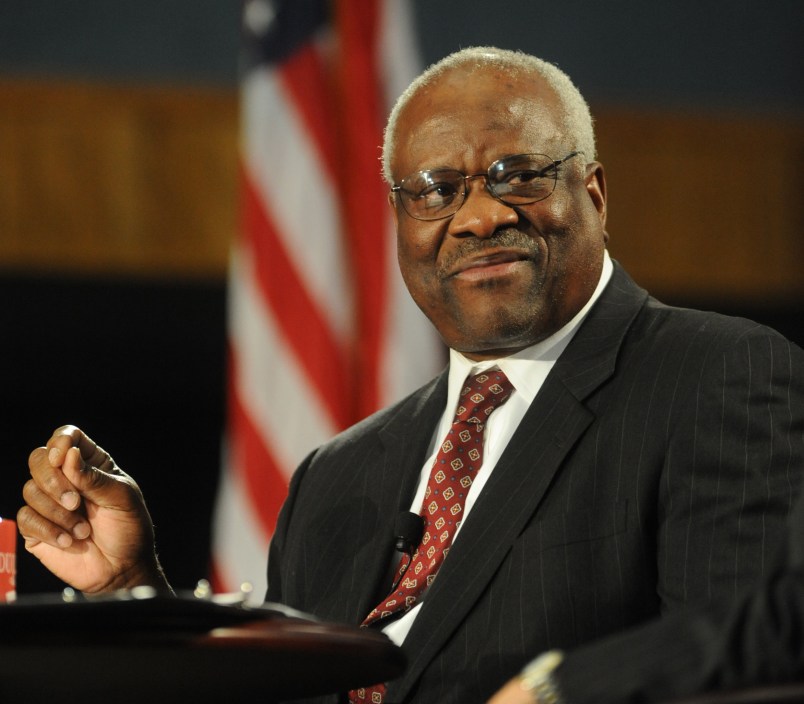Justice Clarence Thomas certainly thinks so.
The Supreme Court on Tuesday denied Alabama’s request to halt legal same-sex marriage in the state until the justices rule on the issue later this year, sparking a scathing dissent by two of the Court’s most conservative members.
The dissent by Thomas, joined by Justice Antonin Scalia, accused the other justices of failing to show “the people of Alabama the respect they deserve” by letting the lower court ruling stand while the case is pending before the Supreme Court. He argued that the order reveals the Court’s intention to rule for same-sex marriage.
“This acquiescence may well be seen as a signal of the Court’s intended resolution of that question,” Thomas wrote. “This is not the proper way to discharge our Article III responsibilities. And, it is indecorous for this Court to pretend that it is.”
“Today’s decision represents yet another example of this Court’s increasingly cavalier attitude toward the States,” he added.
The justices decided last month to take the case after the 6th Circuit Court of Appeals upheld gay marriage bans in four states — Michigan, Ohio, Kentucky and Tennessee. The circuit ruling broke with decisions by four other circuit courts to strike down same-sex marriage bans in the states they cover.
“What struck me about today’s dissent was Justice Thomas’s recognition that these stay orders signal what is likely coming on the merits: a constitutional right to same sex marriage,” Rick Hasen, a law professor at UC Irvine, wrote. “The tone was one of resignation of what is coming and a lament about the loss of the power of the states.”
Recorded dissents — or lack thereof — in orders responding to injunction requests aren’t always indicative of how justices will rule on the merits. But they can offer a tantalizing peek into the minds of the country’s nine most powerful judges, who will decide this year if same-sex couples have a constitutional right to marry.
The Thomas-Scalia dissent suggests the two are sympathetic to laws banning gay marriage.
Notably, Chief Justice John Robert and Justice Samuel Alito did not formally dissent. Both of them voted against gay-rights advocates in 2013, and neither is seen as a good bet to overturn state bans on same-sex marriage this year. A likelier bet among the conservative members is Justice Anthony Kennedy, who has written the Court’s three key decisions in favor of gay rights since 1996. He is widely expected to rule in favor of same-sex marriage again.
“It’s going to be hard to count to five [Supreme Court] votes for upholding these laws” banning gay marriage, Paul Clement, the lawyer who unsuccessfully asked the justices to uphold the Defense of Marriage Act in 2013, said last fall.
Brian Fitzpatrick, a law professor at Vanderbilt University, said he agrees with Thomas’ view but argued that “the Court tipped its hand long ago” by letting other pro-gay-marriage rulings by lower courts stand.
“It seems obvious that every gay marriage that takes place makes it more difficult to rule against gay marriage in the end,” he said. “I can’t imagine the conservatives on the Court would have turned down these other cases and allowed all those marriages to take place over the last several months if they did not know that they were going to lose on the merits.”
Many legal experts predict the same outcome.
“I guess Clarence Thomas knows what’s comin’,” said Adam Winkler, a law professor who supports marriage equality. “Don’t we all, at this point?”







Clarence Thomas spoke?
my thought too. Scalia must have been running late from his Depends change.
When Thomas’ wife got all that money for gutting Obamacare, that was a reveal for how Thomas was going to vote on that. So, fuck you Thomascalia.
It doesn’t matter to me who wants to enter the retrograde institution of marriage.
This will be the most anti-climatic Supreme Court decision in recent memory.
Justice Thomas and I agree about one thing: this almost certainly shows the Court’s hand regarding SSM becoming a constitutional right in all of the 50 states. However, I don’t necessarily understand why Justice Thomas thinks that a majority of the Court should vote to stop SSM in Alabama now if they are inclined to vote to allow it later. Justice delayed is justice denied, Justice Thomas.
I would also add that the Court showed their hand several months ago when they refused to hear Utah and Oklahoma’s appeals. If the Justices opposed to SSM would have had the votes to stop it and return SSM to the states, they most certainly would have.